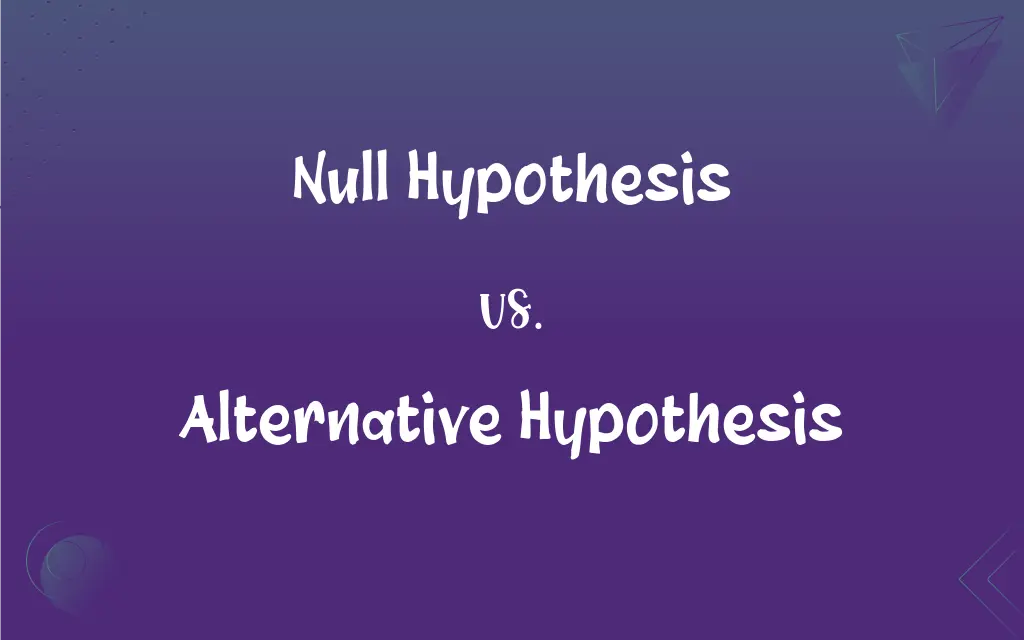Null Hypothesis vs. Alternative Hypothesis: What's the Difference?
Edited by Aimie Carlson || By Harlon Moss || Published on February 11, 2024
The null hypothesis asserts no effect or difference; the alternative hypothesis proposes a specific effect or difference.

Key Differences
The null hypothesis is a statement used in statistics that proposes no significant difference or effect exists in a set of given observations. The alternative hypothesis, conversely, is a statement that suggests a significant difference or effect does exist. Both hypotheses are used in statistical testing as contrasting propositions.
In statistical analysis, the null hypothesis serves as a baseline or default position, assuming that there is no relationship or effect in the population. The alternative hypothesis posits the opposite, asserting that there is a meaningful relationship or effect. These hypotheses are mutually exclusive and exhaustive, covering all possible outcomes.
The null hypothesis is often symbolized as H0 and is subject to testing to determine if it can be rejected. The alternative hypothesis, symbolized as H1 or Ha, is considered when evidence suggests that the null hypothesis is unlikely. These hypotheses form the foundation of hypothesis testing in statistics.
Critical to hypothesis testing, the null hypothesis assumes the status quo or a position of no change, which is tested for its validity. The alternative hypothesis represents a new theory or belief, suggesting a change from the status quo. Statistical evidence is used to decide between these two hypotheses.
The null hypothesis is crucial for the 'innocent until proven guilty' approach in statistics, where no effect is assumed until evidence suggests otherwise. The alternative hypothesis embodies the claim that there is an effect or difference, challenging the status quo represented by the null hypothesis.
ADVERTISEMENT
Comparison Chart
Statement Type
Asserts no effect or difference
Proposes a specific effect or difference
Symbolization
Often denoted as H0
Usually denoted as H1 or Ha
Role in Testing
Serves as a default position
Represents a new claim or theory
Assumption
Assumes status quo (no change)
Suggests a change from the status quo
Outcome in Testing
Retained or not rejected if evidence is insufficient
Accepted or considered when evidence is against H0
ADVERTISEMENT
Purpose in Analysis
Used to test for evidence against the assumed condition
Used to advocate for a new or different condition
Null Hypothesis and Alternative Hypothesis Definitions
Null Hypothesis
It's a default hypothesis that indicates no expected change.
In climate research, the null hypothesis might posit that a new factor does not affect global temperatures.
Alternative Hypothesis
Asserts an expected change or difference from the norm.
A climate study’s alternative hypothesis could argue that a new factor significantly increases global temperatures.
Null Hypothesis
The null hypothesis is a baseline theory of no effect or association.
For a test on sleep patterns, the null hypothesis might be that increased exercise does not affect sleep quality.
Alternative Hypothesis
Reflects a proactive stance, positing a new effect or relationship.
For an educational methods study, the alternative hypothesis might suggest that a novel teaching strategy enhances student learning.
Null Hypothesis
The null hypothesis proposes no significant difference or effect.
In testing a new drug, the null hypothesis states that the drug has no effect on patients compared to a placebo.
Alternative Hypothesis
Proposes a relationship or effect between variables.
The alternative hypothesis in a diet and heart health study might claim that a specific diet reduces the risk of heart disease.
Null Hypothesis
Null hypothesis assumes no relationship between variables.
The null hypothesis for a study on diet and heart health would assert that diet has no impact on heart health.
Alternative Hypothesis
A theoretical assertion contesting the null hypothesis.
In research on sleep patterns, the alternative hypothesis might propose that increased exercise leads to better sleep quality.
Null Hypothesis
Represents a skeptical standpoint, presuming no effect without evidence.
In a study about educational methods, the null hypothesis could be that a new teaching strategy has no impact on student performance.
Alternative Hypothesis
The alternative hypothesis suggests a specific effect or difference exists.
In testing a new drug, the alternative hypothesis would claim that the drug improves patient health outcomes.
FAQs
What does an alternative hypothesis represent?
It represents a statistical claim that there is a significant difference or effect, contrary to the null hypothesis.
Can both null and alternative hypotheses be true?
No, they are mutually exclusive; if one is true, the other must be false.
Why is the alternative hypothesis important?
It's important for proposing a specific effect or relationship that challenges the status quo assumed by the null hypothesis.
How is the null hypothesis used in hypothesis testing?
It's used as a default position to test against, with the aim of either rejecting or failing to reject it based on evidence.
What is a null hypothesis?
A null hypothesis is a statement in statistics that suggests no significant difference or effect in a given set of data.
How do researchers decide between these hypotheses?
Through statistical tests that evaluate data against the null hypothesis, leading to its rejection or retention.
Is the null hypothesis always about no effect?
Yes, it typically posits no effect, no difference, or no relationship.
What happens if the null hypothesis is rejected?
If rejected, it suggests support for the alternative hypothesis.
Can the alternative hypothesis become a null hypothesis in another test?
Theoretically, yes, if it becomes the new standard or status quo being tested against.
What is a common mistake in formulating these hypotheses?
A common mistake is formulating them so they are not mutually exclusive or not exhaustive.
Is the alternative hypothesis always the research hypothesis?
Often, but not always; it depends on what the researcher is specifically trying to demonstrate.
How does sample size affect hypothesis testing?
Larger sample sizes typically provide more reliable data for testing these hypotheses.
Can these hypotheses change during research?
They should be defined prior to data collection and analysis to avoid bias.
Are null and alternative hypotheses always quantitative?
They are often quantitative but can also be qualitative, depending on the research question.
How specific should an alternative hypothesis be?
It should be as specific as possible to clearly state the expected effect or difference.
Can there be multiple alternative hypotheses?
Yes, there can be multiple, but each is tested against the same null hypothesis.
What role do these hypotheses play in scientific research?
They form the basis for statistical hypothesis testing, a fundamental aspect of empirical research.
Can we prove the null hypothesis?
In statistics, we typically don't prove the null; we only reject or fail to reject it based on evidence.
Why can't we accept the null hypothesis?
Accepting the null would imply proving a negative, which is not feasible with statistical testing.
Does failing to reject the null hypothesis mean it's true?
No, it only means there's not enough evidence against it.
About Author
Written by
Harlon MossHarlon is a seasoned quality moderator and accomplished content writer for Difference Wiki. An alumnus of the prestigious University of California, he earned his degree in Computer Science. Leveraging his academic background, Harlon brings a meticulous and informed perspective to his work, ensuring content accuracy and excellence.
Edited by
Aimie CarlsonAimie Carlson, holding a master's degree in English literature, is a fervent English language enthusiast. She lends her writing talents to Difference Wiki, a prominent website that specializes in comparisons, offering readers insightful analyses that both captivate and inform.






































































